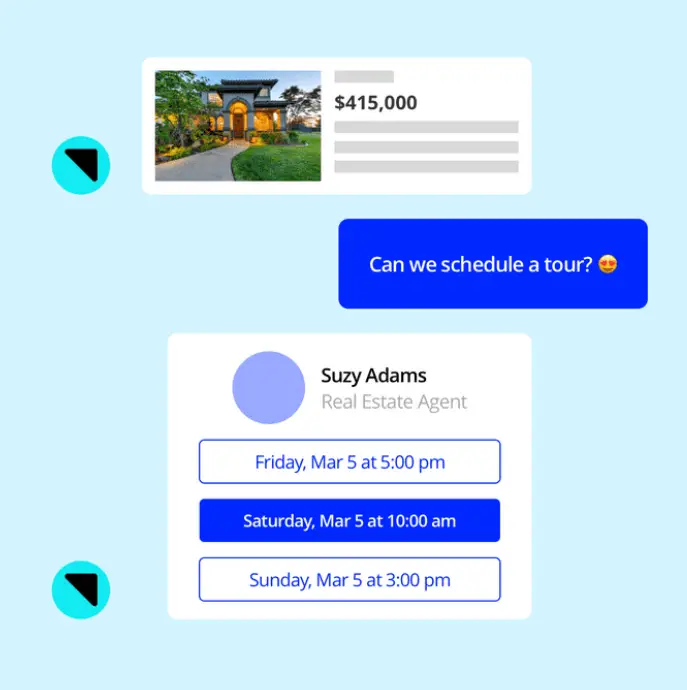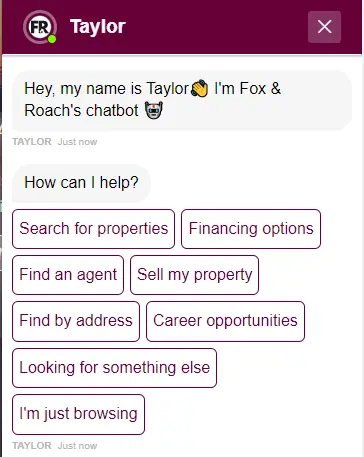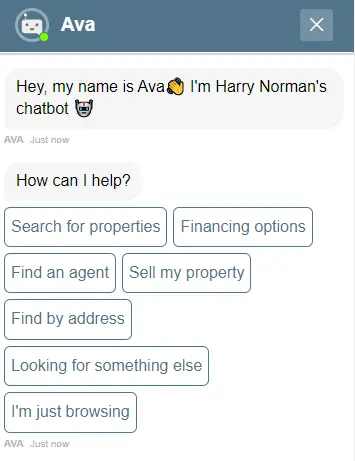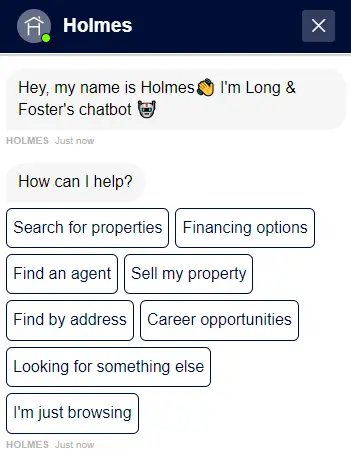Ever wondered how artificial intelligence could revolutionize your interactions with potential clients on your website?
You’ve heard the buzzwords: AI, machine learning, automation.
But how do they tangibly fit into the world of real estate website conversions and interactions with customers? Let’s unfold this mystery together.
That’s where Roof AI comes in.
“Roof AI helps real estate companies increase their revenue online by generating core service opportunities in brokerage, mortgage, relocation, insurance and warranty.” claims their home page.
But how does it perform these seemingly magical feats?
In today’s article, I will take a closer look and will discuss…
- What Roof AI is
- It’s features
- Roof AI’s User Experience
- Pricing
- The pros and cons
- Two Roof AI alternatives
Intrigued? Then, please read on…
What Is Roof AI?
Roof AI’s home page opens with its value proposition “Roof AI helps real estate companies increase their revenue online by generating core service opportunities in brokerage, mortgage, relocation, insurance, and warranty. “
It’s okay sales copy, but I doubt the first-time visitor will immediately compute it.
So what is Roof AI, then?
Roof AI is a technology company providing AI-driven solutions designed for the real estate industry.
Its headquarters are in Montréal, Canada, founded in 2015 by Michel Moubarak and Pierre Sabbagh (source). So you could still consider it as a startup.
Roof AI’s platform uses machine learning and artificial intelligence to automate various processes, such as…
- Customer service including
- Personalized website content
- Lead generation
- Mortgage lead generation
- Property recommendations
It can analyze and interpret customer data to deliver personalized communication and suggest properties that align with a buyer’s preferences.
Moreover, Roof AI can integrate with existing real estate platforms, allowing businesses to streamline operations and improve efficiency.
The company’s main goal is to minimize the time real estate agents spend on administrative tasks, thus enabling them to focus more on customer service and negotiation.
Roof AI Features
On Roof AI’s website, the following is stated as:
- Chat
- Bots
- Instant Answers
- Recommendations
- Personalization
- Marketing Automation
- Behavioral Tracking
- Integrations
However, after a thorough look into them, about 80% overlap and are built on each other.
Therefore, I could identify four distinguishable features: the AI-powered chatbot, marketing automation, behavioral tracking, and integrations.
So let’s dive a bit deeper into the features. Since several features overlap, I use some together below to reduce redundancy.
1) The AI-Powered Chatbot
The chat and bot feature mainly aims to connect with your real estate website visitors, understand their needs, and provide automated and individualized customer service.
Similar to ChatGPT, the chat feature has a memory. This allows visitors to pause and continue a conversation later; no account has to be created.
An example conversation would look like this:
“Ben, thanks for stopping by again…Since your last visit, there have been five more property matches for you. Want to learn more?”
The chat also integrates various MLSs and can also schedule showings.
So when a potential buyer interacts with the chat, they may be interested in a showing at some point. Here the Roof AI’s chat would suggest different showing dates and show which agent would be in charge (see screenshot below).
Similarly, it can answer other inquiries and provide customer resolution.

The chat feature also helps you qualify potential buyers.
As I discussed in this article, it can connect with email marketing campaigns, so you can use a better converting omnichannel approach.
2) Marketing Automation
Roof AI’s marketing automation features help you segment your audience so you can better target them and send targeted campaigns.
This is an important feature since you always want to consider different types of real estate leads in your messaging, leading to better engagement.
Additionally, this feature includes customer journeys, which help the chats determine where the potential client is in the real estate funnel and enables them to personalize marketing campaigns.
The next sub-feature is nurturing campaigns using personalized content depending on the above segmentation and customer journey.
3) Behavioral Tracking
Since Roof AI can track historical data, online activity, and engagement levels, it can estimate and understand the intent of each visitor. It can do this across multiple channels.
What can be done with this data?
This information helps Roof AI’s chat to communicate with potential clients at a highly individual level.
4) Integration
In a recent article about AI in real estate investments, I already discussed the hurdles of AI integration.
Therefore I was glad to learn that Roof AI makes an effort to integrate many different tools, such as CRM, sales, marketing, and recruiting software.
As mentioned earlier, it also integrates MLSs and lead routers.
A lead router is typically a CRM feature that automatically distributes leads to sales reps according to pre-defined criteria such as lead score, location, etc.
So, which tools does Roof AI integrate?
According to its website, it integrates with…
- IDC Global
- Reliance Network
- Buyside
- Zillow
- Opcity/Realtor.com (real estate leads pay at closing)
- Gmail
- LiveBy
- Google Sheets
- homesnap
- twilio
- Tribus
- kvCore
- Typeform
Roof AI User Experience
Finding user reviews to learn how various people experience Roof AI was tricky, to say the least.
I applied several research approaches and found nothing on various forums and user-generated review sites.
So I had to be more creative and see first-hand what Roof AI may look and feel like on real estate broker and agent websites.
And with this more creative research approach, I was more successful and found three real estate websites that implemented Roof AI.
It’s Berkshire Hathaway Homeservices – Fox & Roach Realtors, Harry Norman Realtors, and Long and Foster Real Estate.
The first impression was that the chatbot isn’t implemented so that it gets into your face with a bell sound, as other websites often like to do.
And as you can see in the below screenshots, all three will start the interaction with the same first message when you click on them.



As you can also notice in the screenshot, the chat interface can be tailored to the overall website’s branding colors.
The Berkshire Hathaway website did the best job regarding customizing it to its brand.
I would have loved to find more information about the experience other users had with Roof AI, so I am left with a bit of an “open loop.”
Roof AI Pricing
Roof AI pricing is a bit of a black box. No pricing plans are disclosed on their website.
When companies do this, it usually means that a customized service is involved, which will depend on the client’s requirements.
So we can assume a done-for-you customization and implementation service.
It also often means that pricing starts in the four figures.
This website, too, wasn’t lucky to get concrete pricing information since it only mentioned the pricing was “average.” Not sure what this means.
Roof AI’s Pros and Cons
| Pros | Cons |
|---|---|
| Automation: Roof AI uses artificial intelligence to automate various real estate processes such as lead generation, customer service, and property recommendations, which can help real estate agents save time and effort. | Dependence on Data Quality: The accuracy and effectiveness of Roof AI's machine learning algorithms largely depend on the quality of data fed into it. Inaccurate or incomplete data can negatively impact the performance of the platform. |
| Integration: Roof AI can be integrated with existing real estate platforms, allowing for seamless transition and customization to fit individual business needs. | AI Limitations: While AI can greatly assist in many tasks, it might not fully replace the personal touch and expert judgment that human real estate agents can provide. |
| Data-Driven Decisions: With the use of AI and machine learning, Roof AI is capable of analyzing large amounts of data to make accurate predictions about buyer preferences, which can help agents provide a more personalized service to their clients. | Adaptability: It might take time for some users to adapt to this new technology, especially for those who are less tech-savvy. |
| 24/7 Availability: The AI-based chatbot can provide round-the-clock assistance, responding to queries and engaging potential buyers anytime, which could lead to higher customer satisfaction. | Price: Pricing wasn't disclosed on Roof AI's website. It likely starts at higher price-points, which may be a barrier for some users. By the larger brokerages using the software, it's likely the software is not the best fit for smaller agents. |
Two Roof AI Alternatives
You can consider all AI-powered chatbots that can personalize website content, are already tailored to real estate use cases, or are customizable to them as Roof AI alternatives.
And Roof AI did a pretty decent job in carving out a niche and positioning itself for real estate use cases since I could identify only two alternative solutions approaching being an alternative, which are Writesonic and Chatbot.
Both are not tailored to real estate, so you would have to make them suitable.
This also explains Roof AI’s done-for-you approach to help real estate professionals integrate their solutions on their websites.
This article has been reviewed by our editorial team. It has been approved for publication in accordance with our editorial policy.
- Why Real Estate Conversion Rates Are 6-Times Below Average - March 21, 2024
- How to Manage Your Apartment Advertising Campaign - February 23, 2024
- Finding Marketing Channels for Apartment Advertising - February 12, 2024

